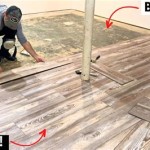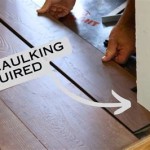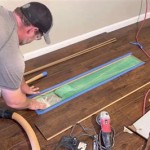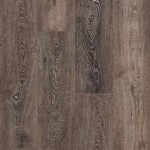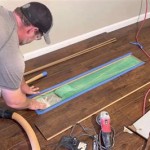Is Vinyl Plank Flooring Safe For Stairs In Georgia?
Vinyl plank flooring has surged in popularity among Georgia homeowners, lauded for its durability, water resistance, and aesthetic appeal. Its versatility has extended its application beyond typical flooring areas, prompting a crucial question: is it safe for use on stairs, particularly considering Georgia's distinct climate and building codes?
The suitability of vinyl plank flooring for stairs is a multifaceted issue, hinging on factors like the specific type of vinyl plank, the installation method, the presence of stair nosing, and adherence to safety standards. This article will delve into these aspects, providing a comprehensive understanding of the safety considerations associated with using vinyl plank flooring on stairs in Georgia.
Understanding Vinyl Plank Flooring and its Properties
Vinyl plank flooring, often abbreviated as LVP (Luxury Vinyl Plank), is a synthetic flooring material designed to mimic the appearance of hardwood or stone. It's constructed from multiple layers, typically including a wear layer, a decorative layer, a core layer, and sometimes an underlayment. The wear layer, usually made of polyurethane or a similar protective coating, is crucial for resisting scratches, stains, and wear and tear, influencing the flooring's overall longevity and safety. The decorative layer provides the aesthetic appeal, while the core layer contributes to the plank's stability and water resistance. The presence and quality of the underlayment impact sound absorption and comfort underfoot.
There are primarily two types of vinyl plank flooring: rigid core and flexible vinyl. Rigid core LVP, also known as SPC (Stone Plastic Composite) or WPC (Wood Plastic Composite), boasts a more robust and dimensionally stable core, making it less susceptible to expansion and contraction due to temperature fluctuations. Flexible vinyl, on the other hand, is more pliable and typically less expensive. The choice between these two types is crucial when considering their application on stairs, as dimensional stability is paramount for safety.
In Georgia, the climate is characterized by hot, humid summers and mild winters. These seasonal temperature and humidity shifts can affect the expansion and contraction of flooring materials. Therefore, choosing a vinyl plank with high dimensional stability is vital to prevent warping, buckling, or gapping, which could create tripping hazards on stairs.
Safety Considerations for Vinyl Plank on Stairs
The primary safety concern when using vinyl plank flooring on stairs is the potential for slips and falls. Stairs, by their very nature, present an increased risk of accidents, and the choice of flooring material can either exacerbate or mitigate this risk. Several factors contribute to the overall safety profile of vinyl plank flooring on stairs:
Slip Resistance: The slip resistance of the vinyl plank's surface is a crucial consideration. Some vinyl planks have textured surfaces designed to enhance grip and reduce the likelihood of slipping. It's recommended to check the flooring's slip resistance rating, typically measured using a dynamic coefficient of friction (DCOF) test. A higher DCOF value indicates better slip resistance. Flooring intended for stairs should ideally have a DCOF rating that meets or exceeds the recommendations of relevant safety standards.
Installation Method: The installation method significantly impacts the stability and safety of vinyl plank flooring on stairs. There are primarily two installation methods: glue-down and click-lock. Glue-down installation involves adhering the planks directly to the stair treads and risers using a specialized adhesive. This method provides a more secure and permanent bond, minimizing the risk of the planks shifting or loosening over time. Click-lock installation, while easier and faster, relies on interlocking edges to hold the planks together. While suitable for many flooring applications, it may not be as secure as glue-down for stairs, particularly under heavy foot traffic. A hybrid approach, using both glue and interlocking features, is sometimes recommended for optimal stability on stairs.
Stair Nosing: Stair nosing is the rounded edge that extends slightly over the edge of the stair tread. It provides a visual cue of the stair's edge and enhances safety by providing a more secure footing. When installing vinyl plank flooring on stairs, it's essential to use compatible stair nosing that is specifically designed for use with vinyl plank. The stair nosing should be securely attached to the stair tread to prevent tripping hazards. Moreover, the stair nosing should provide a smooth, continuous transition between the flooring and the edge of the stair, minimizing the risk of catching a shoe or foot.
Adherence to Building Codes: Georgia, like other states, has building codes that govern the construction and renovation of buildings, including requirements for stairways. These codes often specify requirements for stair tread depth, riser height, and the slip resistance of stair surfaces. Before installing vinyl plank flooring on stairs, it's crucial to consult with local building officials or a qualified contractor to ensure compliance with all applicable codes. Failure to comply with building codes can result in fines, delays, and potentially unsafe conditions.
Best Practices for Installing Vinyl Plank on Stairs in Georgia
To ensure the safe and successful installation of vinyl plank flooring on stairs in Georgia, several best practices should be followed:
Material Selection: Choose a rigid core vinyl plank with a high wear layer rating and a textured surface to enhance slip resistance. Opt for a product that is specifically designed for use on stairs or is known to perform well in stair applications. Consider the dimensional stability of the plank, particularly in relation to Georgia's climate. Look for products with warranties that cover stair installations.
Professional Installation: While DIY installation may be tempting, professional installation is highly recommended for vinyl plank flooring on stairs. Experienced installers have the knowledge and skills to properly prepare the stair surfaces, apply adhesives, cut and fit the planks, and install stair nosing securely. They can also identify and address any potential challenges or safety concerns during the installation process.
Proper Substrate Preparation: The substrate, or the surface to which the vinyl plank is being installed, must be clean, dry, level, and stable. Any imperfections in the substrate, such as cracks, holes, or unevenness, should be repaired before installation. Uneven surfaces can compromise the stability of the vinyl plank and create tripping hazards. In some cases, it may be necessary to install a new subfloor or underlayment to provide a smooth and level surface.
Secure Attachment of Stair Nosing: The stair nosing should be securely attached to the stair tread using both adhesive and fasteners. Ensure that the stair nosing is flush with the vinyl plank surface and that there are no gaps or sharp edges. The stair nosing should also be slip-resistant and durable enough to withstand heavy foot traffic.
Regular Maintenance: Regular maintenance is essential to preserve the safety and appearance of vinyl plank flooring on stairs. Clean the stairs regularly with a mild detergent and water to remove dirt, dust, and debris. Avoid using abrasive cleaners or harsh chemicals, as these can damage the wear layer and reduce slip resistance. Inspect the stairs regularly for any signs of damage, such as loose planks, worn stair nosing, or cracks. Repair any damage promptly to prevent accidents.
Consider Adding Area Rugs or Runners: While high-quality vinyl plank can be slip-resistant, adding area rugs or runners to the stairs can provide an extra layer of safety, especially for children, seniors, or individuals with mobility issues. Choose rugs or runners with a non-slip backing to prevent them from sliding. Ensure that the rugs or runners are securely attached to the stairs and that they do not create tripping hazards.
Adequate Lighting: Proper lighting is crucial for stair safety, regardless of the flooring material. Ensure that the stairs are well-lit, especially at night or in dimly lit areas. Consider installing motion-activated lights or adding additional light fixtures to improve visibility.
In conclusion, while vinyl plank flooring can be a suitable option for stairs in Georgia, careful consideration must be given to material selection, installation method, stair nosing, adherence to building codes, and ongoing maintenance. By following best practices and prioritizing safety, homeowners can enjoy the aesthetic and functional benefits of vinyl plank flooring on their stairs while minimizing the risk of accidents.

Us Vinyl Floor Bending Georgia Custom Bent Luxury Plank Stair Treads Nosings Md

Us Vinyl Floor Bending Georgia Custom Bent Luxury Plank Stair Treads Nosings Md

Lvp Stair Treads Ideas

Which Flooring Is Best For Stairs

Us Vinyl Floor Bending Georgia Custom Bent Luxury Plank Stair Treads Nosings Md

Steps Flooring Installation Genie

Luxury Vinyl Plank Flooring Stair Treads

Easy Diy Staircase Makeover Using Vinyl Plank Flooring Anika S Life

Easy Diy Staircase Makeover Using Vinyl Plank Flooring Anika S Life

Cap A Tread Trail Oak 47 In L X 7 37 W 0 56 T Vinyl Stair Reversible Riser 01r073675
See Also
